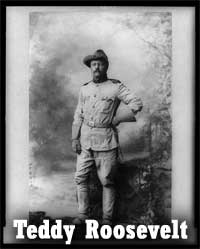 Teddy Roosevelt Influences President Bush
Teddy Roosevelt Influences President Bush
A look back helps understand America’s Global Influence
At home and abroad, he was the locomotive president, the man who drew his flourishing nation into the future.
Just short of a century after he left the White House, in 1909, the collective memory of Theodore Roosevelt’s strength and intellect and charisma still lingers.
Today, when the Justice Department goes after Microsoft or Enron, when the Environmental Protection Agency adjusts mileage standards or the Fed tweaks the prime, somewhere his ghost is smiling.
He was the first president to urge wholeheartedly that the U.S. accept its role as a global power. The “imperial presidencies” that followed his, from Franklin Roosevelt to Lyndon Johnson to George W. Bush, all owe something to his example.
Is it any surprise when presidents try to borrow a bit of his halo? Bill Clinton had Teddy’s bust on his desk. George W. Bush let it be known that he spent last Christmas vacation reading a Roosevelt biography, his second since he got to the White House.
Roosevelt stays with us because he seems so much like one of us. Although he was born in 1858, it’s the 20th century he decidedly belongs to, the century he brought America into on his terms.
When Roosevelt first came to the presidency in 1901, after the assassination of William McKinley, the U.S. was emerging as one of the world’s wealthiest nations. Since 1860 the population had doubled, exports had tripled. But that bounding growth had brought with it all the upheavals of an industrial age — poverty, child labor, dreadful factory conditions.
Roosevelt came to believe that government had the right to moderate the excesses of free enterprise. Although his exercises of power seem modest to us now — the breakup of monopolies, the Pure Food and Drug Act, the meat-inspection and industrial-safety laws — it was a shock to the system at the time. Roosevelt — a Republican! — insisted that one of the things government must govern is the economy.
As at home, so in the world — in all places Roosevelt was an activist. It was not until just before he reached the presidency that the nation had finally burst through its continental confines. In 1898, the Spanish-American War and its aftermath had placed under U.S. supervision a whole collection of territories and dependencies: Cuba, Puerto Rico, Guam and the Philippines. Suddenly, to Roosevelt’s utter delight, the U.S. was acting on a world stage, across two oceans.
We can’t know what he might have thought about Vietnam, much less Iraq. His expansionist impulse had its idealistic side. He too talked about spreading democracy. And you could see its legacy in developments after his death, like the Marshall Plan. But every time the U.S. contrived to overthrow an elected leader abroad who proved resistant to U.S. aims, there too was some of Teddy’s legacy at work.
Another of Roosevelt’s legacies was an unambiguous gift to the future. Under the tutelage of his friends — naturalist and Sierra Club founder John Muir, who convinced Teddy that the federal government would be a better protector of parkland than the states; and U.S. Forest Service chief Gifford Pinchot, who wanted strict controls over commercial use of woodlands — Roosevelt learned to shape his love of nature into a policy to defend it.
We have him to thank not only for the 150 national forests he created, the 51 national wildlife refuges, the five national parks, but also for the very idea that air, water, forests and animal life were somehow in our collective safekeeping.
Above all, Roosevelt had a supreme sense of the great future in store for the U.S. No one was ever more certain of the nation’s destiny, and few presidents were more formidable in shaping it.
More than that, he gave the nation a picture of itself as a place that could not fail to succeed, because it produced people who were vigorous and commanding — people like Teddy Roosevelt. It’s not just that he was excited to be an American. He made it more exciting to be one.
ATTENTION READERS
We See The World From All Sides and Want YOU To Be Fully Informed
In fact, intentional disinformation is a disgraceful scourge in media today. So to assuage any possible errant incorrect information posted herein, we strongly encourage you to seek corroboration from other non-VT sources before forming an educated opinion.
About VT - Policies & Disclosures - Comment Policy



